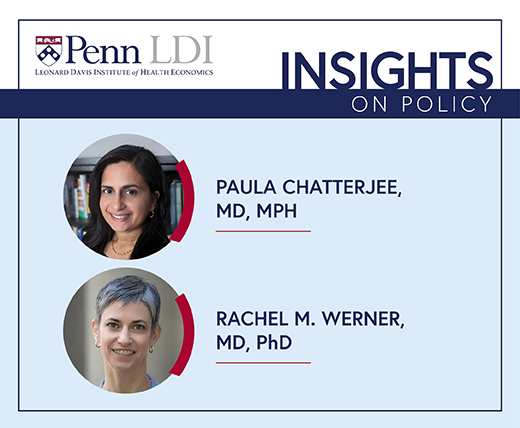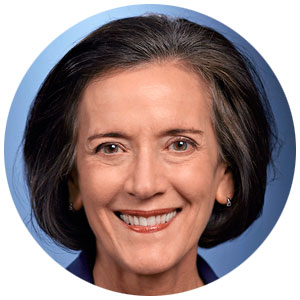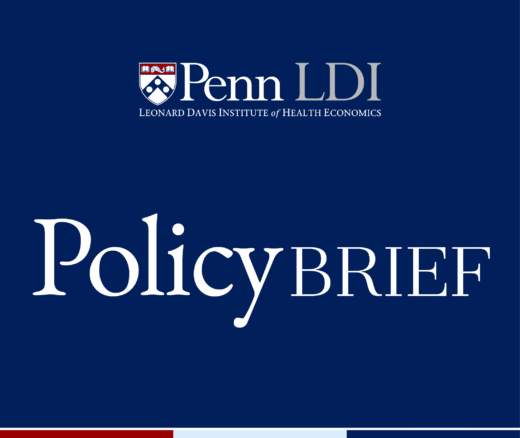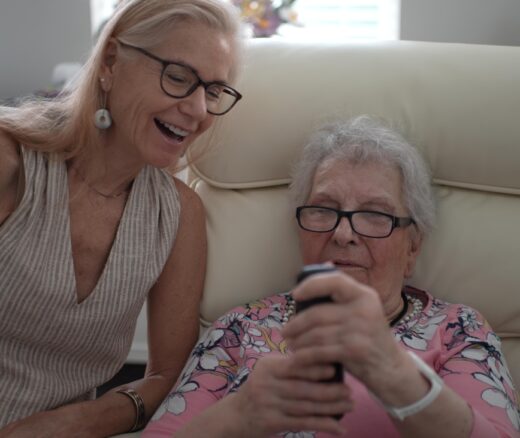
Analysis of the Rural Health Transformation Program
Memo: Response to Request for Analysis
News

David Grande, MD, MPA, Director of Policy at the University of Pennsylvania Leonard Davis Institute of Health Economics (LDI) and Perelman School of Medicine faculty member and researcher, has been named Special Advisor for Medicaid Innovation to Pennsylvania Department of Human Services (DHS) Acting Secretary Valerie Arkoosh, MD, MPH.
A Professor of Medicine and member of the medical staffs of both Penn Presbyterian Medical Center and the Hospital of the University of Pennsylvania, Grande’s research has focused on barriers to care for vulnerable populations and ethical issues related to health care marketing and digital health information privacy.
He joins DHS staff in Harrisburg as the new administration of Governor Josh Shapiro moves to define its approach to the many challenges facing the Medicaid program that covers 3.6 million Pennsylvanians at an annual cost of $37 billion–the state’s largest annual program budget.
Acting Secretary Arkoosh, former Chair of the Montgomery County Board of Commissioners, won wide praise for her efforts to combat the COVID-19 pandemic, including a successful data- and science-driven approach. She has also been a staunch advocate for maternal health and served on the Pennsylvania Maternal Mortality Review Committee.

Prior to stepping into public service, Acting Secretary Arkoosh was a Professor of Clinical Anesthesiology and Clinical Obstetrics and Gynecology at Penn’s Perelman School of Medicine of the University of Pennsylvania. Arkoosh is a graduate of the University of Nebraska College of Medicine and received a Master of Public Health from the Johns Hopkins Bloomberg School of Public Health and previously led the National Physicians Alliance, where she and other physicians advocated for health care reform nationally and in communities around the country. She performed her residency at Jefferson Medical College in Anesthesiology with a special focus in Obstetrics.
“My experience as a physician and what I learned from my patients has guided me throughout my public service career. Their experiences and challenges fuel this work, and I know this is a perspective Dr. Grande and I share,” said Arkoosh. “I firmly believe that DHS’ work should be a catalyst to better individual and community health and fight inequity and disparities. I am very excited to work with Dr. Grande to make this a reality for Pennsylvania.”
“It’s an honor to serve under such an accomplished and distinguished physician and leader,” said Grande, who noted he looks forward to moving beyond academic health policy research into real-life policy development and implementation inside a major state agency.
“My motivation for being in academia has always been to have policy impact, and that has motivated me throughout my entire career,” said Grande. “So, this move is a natural extension of why I came to academia in the first place. It’s an opportunity to roll up my sleeves and really get more directly involved in policy.”
One of the most pressing Medicaid challenges for Pennsylvania is the end of the public health emergency and shift back to the annual eligibility evaluation system that was suspended at the beginning of the COVID-19 pandemic. All state Medicaid recipients now must file to have their eligibility for Medicaid renewal re-evaluated. An estimated 620,000 Pennsylvanians could be ineligible as part of this process that will take place over the next 12 months. Pennsylvanians can learn how to be ready for their renewal at www.dhs.pa.gov/StayCovered.
Another area within Medicaid that DHS hopes to develop further is a strategy aimed at the social determinants of health that directly affect health. This comes as the Biden Administration strongly encourages states to apply for waivers and pursue other mechanisms facilitating new kinds of Medicaid assistance in areas including housing and food insecurity.
“There’s enormous interest right now in how health insurance in general and Medicaid in particular might try to address these issues,” said Grande. “Medicaid can be leveraged to address social needs that have a direct impact on health outcomes and health care use.”
“For example, you can potentially reduce health care costs among people with heart failure or diabetes by making sure they are food secure and have what are called ‘medically tailored meals’—food that is appropriate for their health condition. Over the last few years, research has demonstrated that that’s not just something that is good for people broadly, but it actually can reduce their future health care use. That linkage between addressing a social need and achieving such a direct health impact is what has allowed the federal government to say, ‘We want you to move forward with beginning to pay for these types of interventions through the Medicaid program and evaluate the impact.'”
Another area of DHS interest is more effectively addressing maternal health equity and maternal health outcomes.
“It’s a huge problem in the United States and there are enormous racial disparities,” said Grande. “Medicaid now provides a full 12 months of postpartum coverage. We must find ways to turn this coverage into better outcomes and eradicate racial disparities.”


Memo: Response to Request for Analysis

Lessons from the Past, Imperatives for the Future

A New Study of a Sample of Facilities Found Half Without Any Behavioral Health Staff

Physicians Were Paid About 10% Less for Visits Involving Black and Hispanic Patients, With Pediatric Gaps Reaching 15%, According to a First-of-Its-Kind LDI Analysis

A New Review Finds Hospital Mergers Raise Prices Without Improving Care, and Urges Regulators to Stop Accepting Quality Claims to Justify Consolidations

Technology Helps Older Adults Stay at Home—But May Delay Necessary Transitions to Higher Levels of Care